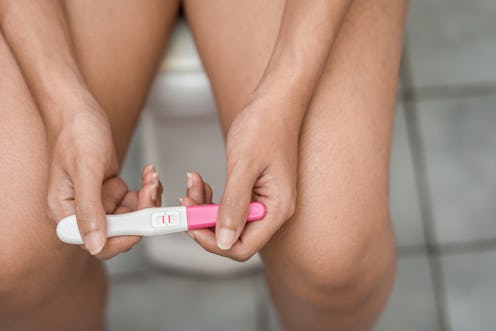Life
A New Campaign Wants To Decriminalise Abortion In England & Wales For Good

In a week where one part of the UK is celebrating the introduction of long-awaited-for reproductive rights, the rest are slowly realising they now live in the least progressive parts of the nation. Thanks to a Victorian-era law, abortion is still technically a criminal offence in England and Wales. But a campaign, led by Refinery29 and an 88-year-old campaigner, is aiming to decriminalise it once and for all.
Currently, England and Wales adhere to the 1967 Abortion Act. (Scotland did too until 2016 when powers were handed over to the Scottish Parliament, per the BBC.) This legislation allows abortions up to 24 weeks, but only if two doctors state that continuing with a pregnancy would involve a greater risk to a person's physical or mental health than terminating it.
Abortions after 24 weeks are permitted, per the BBC, if the pregnant person's life is at risk or if they are at risk of "grave" physical and mental injury, or if there is a severe foetal abnormality. But abortions performed outside of the aforementioned parameters fall under the 1861 Offences Against The Person Act; an act that was never repealed and that punishes both the people assisting and having the abortion with a potential prison sentence. In other words, abortion — a healthcare issue — is still treated as a criminal issue.
People living in Northern Ireland — where abortion has just been decriminalised — thankfully now do not face these worries. People in Scotland have a secondary problem with Scottish health boards only providing abortions up to 18 or 20 weeks, forcing people to travel to England for later terminations, reports Scottish news site CommonSpace. (But this is in the hands of Scottish politicians, not the Prime Minister.)
On Monday, Diane Munday officially launched a Change.org petition to Boris Johnson. A long-time abortion rights campaigner whose efforts eventually resulted in the 1967 Act, she had an abortion in the early '60s after paying a doctor who agreed to perform the procedure.
"As I was coming around from the anaesthetic, all I could think about was a family friend — she had been a dressmaker," Munday, now in her late eighties, told Refinery29. "She had been in a similar situation to me, but she didn’t have a chequebook to wave around in Harley Street so she went to a backstreet abortionist." Munday finished: "She died because my husband earned more than hers."
Over 750 people have already signed the petition, thereby supporting Refinery29's corresponding #ImACriminal campaign. Its words could be an eye-opener for many, if Refinery29's recent survey is anything to go by. According to the publication, 90 percent of the 1,000-plus UK readers polled did not think abortion was a criminal offence in England and Wales.
With one in three women having an abortion before the age of 45, per the British Pregnancy Advisory Service (BPAS), the status quo is dangerous to continue. Medical professionals agree that decriminalisation is long overdue.
"The law from 1861 means that women can’t go to their GP for an abortion, can’t have a home visit from a qualified nurse or doctor if they’re unable to leave the house, and if they buy pills online they’re risking a life sentence. This is what decriminalisation would mean," Rachael Clarke, public affairs and advocacy manager at the BPAS, told Refinery29.
What it won't lead to, she added, is deregulation. "It means abortion would be subject to the same stringent and comprehensive healthcare laws that govern all other women’s healthcare procedures, with appropriate safeguarding protocols, counselling, clinical safety standards, and the need for informed consent. It would make sure that abortion care is finally treated as the healthcare it is."
This article was originally published on